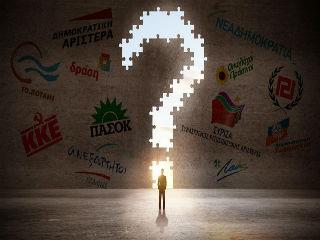The climate is extremely heavy for Greeks in the European Union and the worst case scenarios have already been foreseen. Thus, on January 25th the ones who have not decided yet which party to support will actually determine the future of the country.

“The elections on 25 January are considered to be more crucial than the ones in June 2012”, according to high EU official, who also believes that the EU is tired of paying for Greece.
by
Athanase Papandropoulos
“The
elections on 25 January are considered to be more crucial than the ones in June
2012”, according to high EU official, who also believes that the EU is tired of
paying for Greece.
A
voluntary exit therefore from the EU, would not be a surprise. “Currently
Greece owes 270 billion euro to EU citizens, some of which are poorer than
Greeks […]
Thus, why should these citizens feel disturbed in case of a Grexit
from the Eurozone and maybe from the EU as a whole?
Maybe because they will
lose their money?”. Are they sure that they
will get the money back? Who knows in sixty years time", he wondered.
The
climate is extremely heavy for Greeks in the European Union and the worst case
scenarios have already been foreseen. Thus, on January
25th the ones who have not decided yet which party to support will actually
determine the future of the country.
If centre-right New Democracy gets the
first position or in coalition with The Potami (S&D affiliated but not
official member), will continue the efforts and in one year the 5-year
sacrifices will begin to have concrete results.
Many say they definitely
wish to avoid a scenario where Sryiza will assure the first position. Do
they want to bring about a disaster? Probably not.
They just take seriously
into consideration the populist rhetoric of Mr. Alexis Tsipras and of the “partisans”
who support him.
And let's not forget that
part of these “partisans” has led us to the current deadlock.
Moreover PM
Antonis Samaras and his close aides, including Dim. Stamatis and Ch. Lazaridis,
calmly watch the polls and they do not think that the electoral battle is lost.
They also insist that the
result will be decided by the undecided, with a 70% of them believing that the
country should remain in a pro-European path because the future of Greece lies
in the EU.
"Anything can
happen" insist circles of the Greek PM particularly referring to the
increased clustering of ND (about 80%), while they simultaneously argue that
the goal is the complete absorption of LAOS of George Karatzaferis, the
political neutralization of ANEL and the massive blow against extreme-right
Golden Dawn, adopting a tough "law and order" right-wing agenda.
The
latter was shown by the statements of Mr. Samaras a few days ago, next to the
fence built in Evros to deter illegal immigrants from entering the country.
The main objective is to “repatriate”
the majority of right-wing voters who voted in the EU elections for LAOS
(2.7%), for Independent Greeks (3.46%) and for the Golden Dawn (9.4%).
As recent polls show, a
substantial repatriation has been noted by this pool of voters, which in total is
close to one million.
As Aris Ravanos wrote in
To Vima Sunday Edition, this repatriation is gradual, but mainly from
the right side of ND.
For example, ND receives 20% of the voters who voted for
Golden Dawn, 9.2% of those who voted for ANEL, 7.8% of those who voted for
PASOK, 14.4% of those who voted in favor of The River and 1.6% of those who
voted for SYRIZA.
Also, ND officials argue
that the part of voters who did not want snap elections will punish SYRIZA and
parties who did not vote for Stavros Dimas as Greece’s President.
In addition
PM’s office insists on promoting the popularity of Antonis Samaras and his higher
eligibility as Prime Minister, according to polls, compared to Alexis Tsipras.
But these two elements
are not enough underline in private discussions high officials and they doubt
whether they can reverse the negative climate against ND.
A climate, however, which
remains unclear since the coalition government-and ND in particular- never
attempted to speak the truth.
In this sense, by not
being aware of the truth, also ND view about a post-election catastrophe [in
case of Syriza victory] is canceled and stops being believable.
In this context, the
Greek PM decided to set aside the risks deriving from a Syriza victory and
instead, focus on the program of his party -as, for example, reducing ENFIA (a
“shocking” for many property tax) in 2015, guaranteeing the non-reduction of salaries
and pensions, reduction to 32% of tax rates, from 42% today, and reducing
corporate income tax rates.
These proposals were
mentioned during the presentation of ND’s growth plan for the next day of
the Greek economy, while the main argument of the Prime Minister is that if his
party wins the election, the evaluation with troika will be completed, something
which will bring the end of the bailout and a great debate on the public debt
will start.
This is why the main ND’s
slogan in the coming days, under the second phase of the election campaign,
will be "we speak the truth, we guarantee the future" while running
the first TV spots as well.
It is crystal clear that the election outcome
remains open and it’s the first time where the undecided voters will determine
to such extend the final results.





 By: N. Peter Kramer
By: N. Peter Kramer
